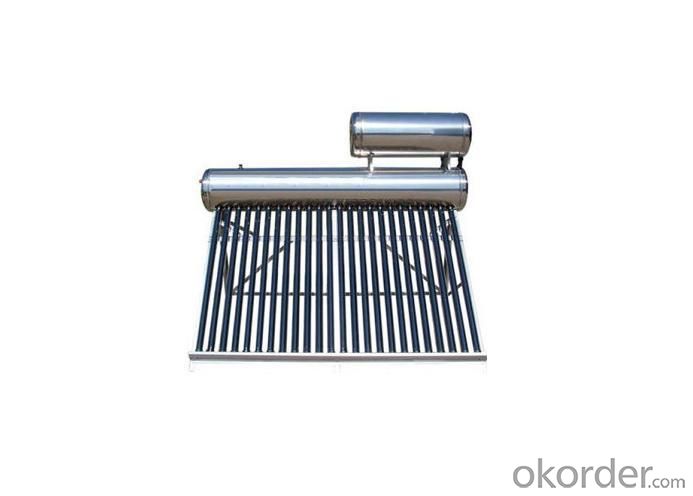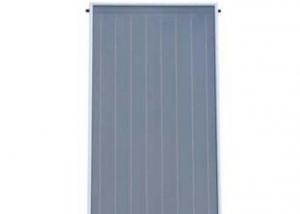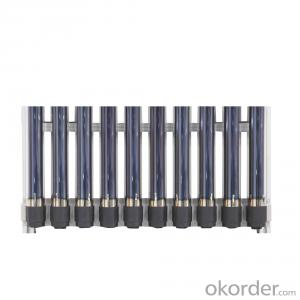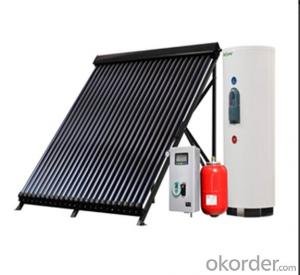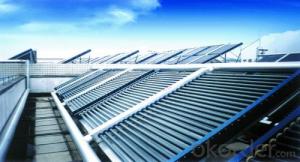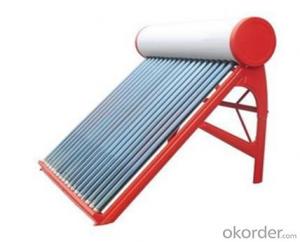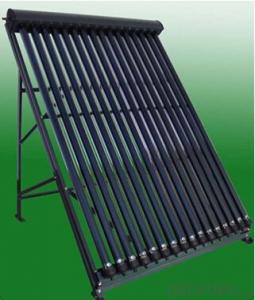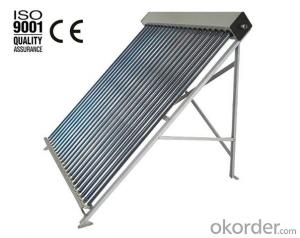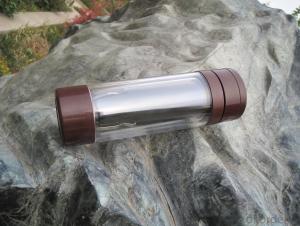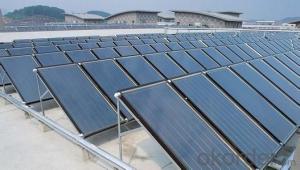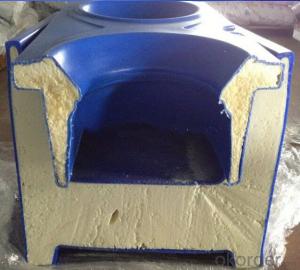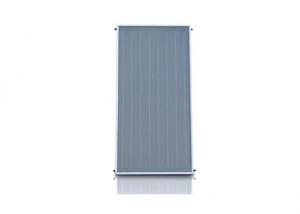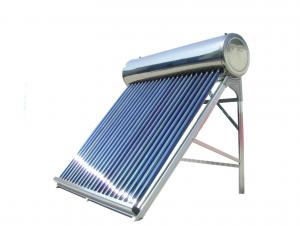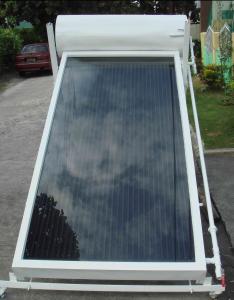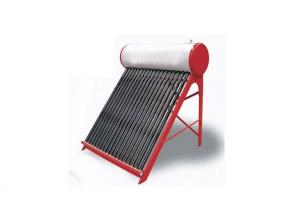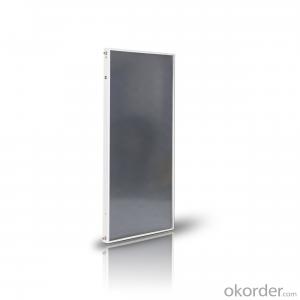New Solar Water Heater for Horse Trough
- Loading Port:
- China Main Port
- Payment Terms:
- TT or LC
- Min Order Qty:
- 1 Set set
- Supply Capability:
- 5000 Sets per Month set/month
OKorder Service Pledge
Quality Product, Order Online Tracking, Timely Delivery
OKorder Financial Service
Credit Rating, Credit Services, Credit Purchasing
You Might Also Like
2013 New solar water heater /2 water tank/assitant tankTake order even 1 pcs. paypal acceptable.
| Non-pressurized Solar Water Heater TECHNICAL DATA | |||||||
| WATER STORAGE TANKS SPECIFICATION | |||||||
| Material of out tank | High quality Painted steel/ Stainless steel. | ||||||
| Material of inner tank | Food grade SUS304-2B stainless steel. | ||||||
| Tank insulating layer | Imported polyurethane can conserve the heat for maximum 72 hours | ||||||
| Inlet and outlet hole | Male G 1/2 | ||||||
| Tank size | 420,460,470,475,480,500mm or Customer demand | ||||||
| Welding: | Argon arc welding | ||||||
| EVACUATED VACUUM TUBES SPECIFICATION | |||||||
| Tube structure | All-glass double deck co-axial structure | ||||||
| Glass material | High borosilicate 3.3 glass | ||||||
| Outer tube dia. & thickness | Ø58±0.7mm; Glass thickness 1.6±0.15mm | ||||||
| Inner tube dia.& thickness | Ø47±0.7mm; Glass thickness 1.6±0.15mm | ||||||
| Tube size | 58*1800mm | ||||||
| Absorptive coating property | Structure | AL/AL-ALN(H)/AL-ALN(L)/ALN or Cu/SS-ALN(H)/SS-ALN(L)/ALN | |||||
| Sediment method | Single target or Three targets - magnetron sputtering plating | ||||||
| Specific absorption | 0.90-0.93(AM1.5) / 0.93-0.96(AM1.5) | ||||||
| Emission ratio | 0.05-0.075(800C±50C) / 0.04-0.06(800C±50C) | ||||||
| Solar irradiation for obtaining a preset water temperature | Φ=58 H≤4.7MJ/m² | H=4.1-4.4MJ/m² / H=3.7-4.2MJ/m² | |||||
| Vacuum tightness | 5.0×10¯³ Pa | ||||||
| Idle sunning property parameters | 220-260 m².C/KW / 260-300 m².C/KW | ||||||
| Average heat loss coefficient | ULT=0.6~0.7W/(M2.0C) / ULT=0.4~0.6W/(M2.0C) | ||||||
| Resistant Hail | ≤25mm | ||||||
| Useful life | 15 years | ||||||
| BRACKET | |||||||
| Bracket: | Stronger galvanized steel / Stainless steel/aluminium alloy | ||||||
| Bracket angle: | 0,18,22,38,45 optional, pitched roof, flat roof optional. | ||||||
| Fastening pieces: | Made of zinc-coated stainless steel.. | ||||||
| MODEL No. | Tube Size | Tube No. | Tank Capacity | Aperture Area | Reommending for family | Load Qty 20GP/40HQ | |
| Dia.*L | ( m2) | (m3) | (sets) | ||||
| JXNP-58-10 | 58*1800mm | 10 | 100 | 0.93 | 2 | 77/184 | |
| JXNP-58-12 | 58*1800mm | 12 | 120 | 1.11 | 2 | 64/153 | |
| JXNP-58-15 | 58*1800mm | 15 | 150 | 1.39 | 3 | 52/123 | |
| JXNP-58-18 | 58*1800mm | 18 | 180 | 1.67 | 4 | 43/102 | |
| JXNP-58-20 | 58*1800mm | 20 | 200 | 1.86 | 5 | 39/92 | |
| JXNP-58-24 | 58*1800mm | 24 | 240 | 2.23 | 6 | 32/77 | |
| JXNP-58-30 | 58*1800mm | 30 | 300 | 2.79 | 7 | 26/61 | |
| JXNP-58-36 | 58*1800mm | 36 | 360 | 3.34 | 8 | 21/51 | |
- Q: How does the angle and orientation of solar panels affect the performance of a solar water heater?
- The angle and orientation of solar panels play a crucial role in the performance of a solar water heater. The angle determines the amount of direct sunlight the panels receive, while the orientation determines the direction in which the panels face. For optimal performance, solar panels should be angled towards the sun and oriented to face true south (in the Northern Hemisphere) or true north (in the Southern Hemisphere). By maximizing exposure to sunlight, the angle and orientation of solar panels can significantly increase the efficiency and effectiveness of a solar water heater.
- Q: How does the temperature of the water affect the performance of a solar water heater?
- The temperature of the water directly affects the performance of a solar water heater. Higher water temperatures result in increased efficiency and faster heating times, allowing the system to produce more hot water. Conversely, colder water temperatures can decrease efficiency and prolong the heating process. Therefore, the temperature of the water plays a crucial role in determining the overall performance and effectiveness of a solar water heater.
- Q: How much space does a solar water heater system require for installation?
- The space required for the installation of a solar water heater system depends on various factors such as the type of system, the size of the system, and local building codes. In general, a solar water heater system typically requires an area of about 10 to 20 square feet for the solar collectors or panels. These collectors need to be placed in a location that receives ample sunlight throughout the day, usually on a south-facing roof or an open area with unobstructed sunlight exposure. Additionally, the system may require space for a solar storage tank, which can range in size from 40 to 120 gallons depending on the household's hot water demand. The storage tank can be placed indoors or outdoors, depending on the available space and local regulations. It is important to consult with a professional solar installer who can assess your specific needs and provide accurate information on the space requirements for your particular solar water heater system.
- Q: Can a solar water heater be used in areas with limited access to water infrastructure?
- Areas with limited access to water infrastructure can utilize solar water heaters. These devices utilize the sun's energy to heat water, eliminating the need for conventional water infrastructure such as pipes and pumps. Solar water heaters typically consist of a solar collector, which absorbs heat from the sun, and a storage tank to store the heated water. Because solar water heaters do not depend on a continuous water supply, they can effectively address the water infrastructure limitations in certain areas. They can be employed in secluded locations with restricted access to clean water or in areas where traditional water infrastructure is unreliable or non-existent. Solar water heaters are simple to install and maintain, and they can provide hot water for various purposes like bathing, cooking, and cleaning. By harnessing the sun's power, they offer a sustainable and cost-efficient solution for heating water in areas with limited access to water infrastructure.
- Q: How does the efficiency of a solar water heater vary with different designs?
- The efficiency of a solar water heater can vary with different designs based on factors such as the collector area, insulation, heat transfer mechanisms, and overall system design. Designs that have larger collector areas and better insulation tend to be more efficient as they can capture and retain more solar energy. Additionally, designs that incorporate efficient heat transfer mechanisms, such as using heat pipes or direct circulation systems, can also improve overall efficiency. Ultimately, the efficiency of a solar water heater is influenced by these design factors and can vary depending on how well they are optimized.
- Q: Can a solar water heater be used in areas with high levels of urban shading?
- Solar water heaters rely on direct sunlight to function efficiently. Therefore, in areas with high levels of urban shading, the performance of a solar water heater may be significantly reduced. The presence of buildings, trees, or other structures that cast shadows on the solar panels can hinder the absorption of sunlight, resulting in decreased heating capacity. Consequently, it is generally recommended to install solar water heaters in areas with ample sunlight and minimal shading for optimal performance.
- Q: Can a solar water heater be used in combination with other renewable energy systems?
- Indeed, the utilization of a solar water heater alongside other renewable energy systems is quite feasible. It is a prevalent practice to integrate solar water heaters with other sources of renewable energy in order to optimize energy efficiency and diminish dependence on conventional energy sources. One popular approach involves coupling a solar water heater with a photovoltaic (PV) system. The PV system harnesses sunlight to generate electricity, which can then be utilized to power the electric components of the solar water heater, such as circulation pumps or controls. This amalgamation enables the creation of a more eco-friendly and self-sustaining water heating system. Furthermore, solar water heaters can also be harmoniously integrated with other renewable energy systems, such as wind turbines or geothermal heat pumps. These combinations offer a holistic and adaptable solution for renewable energy, as they make use of multiple sources of clean energy to meet diverse energy requirements. By integrating various renewable energy systems, individuals and organizations can effectively reduce their carbon footprint, lower energy expenses, and enhance their energy autonomy. The fusion of a solar water heater with other renewable energy technologies represents a significant stride towards a more sustainable and environmentally conscious energy future.
- Q: Can a solar water heater be used in areas with limited biofuel resources?
- Yes, a solar water heater can certainly be used in areas with limited biofuel resources. Solar water heaters rely on the energy from the sun to heat water, making them independent of biofuel resources. They are a sustainable and renewable alternative to traditional water heaters, making them a viable option in areas where biofuel resources are scarce or limited.
- Q: Can a solar water heater be used with a well or borehole system?
- Yes, a solar water heater can be used with a well or borehole system. The solar water heater utilizes sunlight to heat the water, and it can be connected to any water source, including wells or boreholes, to provide hot water.
- Q: Can a solar water heater be used in areas with high levels of humidity?
- Yes, a solar water heater can be used in areas with high levels of humidity. The efficiency of the solar water heater may be slightly affected due to the presence of moisture in the air, but it can still effectively harness solar energy to heat water. Regular maintenance and proper ventilation can help mitigate any potential issues caused by humidity.
Guided by business philosophy, our company has experienced success in the three historic periods, noted as brand building, diversification and globalization. It has long attached significance to innovation in satisfying the demands of worldwide consumers and realizing win-win performance between our company and our clients.
1. Manufacturer Overview
| Location | Zhejiang,China |
| Year Established | 2006 |
| Annual Output Value | |
| Main Markets | North America South America Eastern Europe Africa Oceania Mid East Western Europe Central America Domestic Market |
| Company Certifications | ISO9001:2008;CE;CCC |
2. Manufacturer Certificates
| a) Certification Name | |
| Range | |
| Reference | |
| Validity Period |
3. Manufacturer Capability
| a) Trade Capacity | |
| Nearest Port | SHANGHAI,NINGBO |
| Export Percentage | 71% - 80% |
| No.of Employees in Trade Department | 6-10 People |
| Language Spoken: | English, Chinese, Spanish, Portuguese, French, Russian |
| b) Factory Information | |
| Factory Size: | 5,000-10,000 square meters |
| No. of Production Lines | Above 10 |
| Contract Manufacturing | OEM Service Offered Design Service Offered Buyer Label Offered |
| Product Price Range | |
Send your message to us
New Solar Water Heater for Horse Trough
- Loading Port:
- China Main Port
- Payment Terms:
- TT or LC
- Min Order Qty:
- 1 Set set
- Supply Capability:
- 5000 Sets per Month set/month
OKorder Service Pledge
Quality Product, Order Online Tracking, Timely Delivery
OKorder Financial Service
Credit Rating, Credit Services, Credit Purchasing
Similar products
Hot products
Hot Searches
Related keywords

